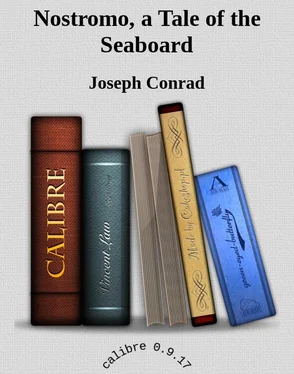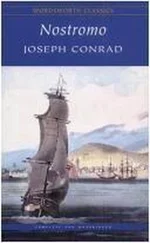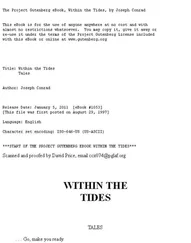Joseph Conrad - Nostromo, a Tale of the Seaboard
Здесь есть возможность читать онлайн «Joseph Conrad - Nostromo, a Tale of the Seaboard» весь текст электронной книги совершенно бесплатно (целиком полную версию без сокращений). В некоторых случаях можно слушать аудио, скачать через торрент в формате fb2 и присутствует краткое содержание. Жанр: Старинная литература, на английском языке. Описание произведения, (предисловие) а так же отзывы посетителей доступны на портале библиотеки ЛибКат.
- Название:Nostromo, a Tale of the Seaboard
- Автор:
- Жанр:
- Год:неизвестен
- ISBN:нет данных
- Рейтинг книги:4 / 5. Голосов: 1
-
Избранное:Добавить в избранное
- Отзывы:
-
Ваша оценка:
- 80
- 1
- 2
- 3
- 4
- 5
Nostromo, a Tale of the Seaboard: краткое содержание, описание и аннотация
Предлагаем к чтению аннотацию, описание, краткое содержание или предисловие (зависит от того, что написал сам автор книги «Nostromo, a Tale of the Seaboard»). Если вы не нашли необходимую информацию о книге — напишите в комментариях, мы постараемся отыскать её.
Nostromo, a Tale of the Seaboard — читать онлайн бесплатно полную книгу (весь текст) целиком
Ниже представлен текст книги, разбитый по страницам. Система сохранения места последней прочитанной страницы, позволяет с удобством читать онлайн бесплатно книгу «Nostromo, a Tale of the Seaboard», без необходимости каждый раз заново искать на чём Вы остановились. Поставьте закладку, и сможете в любой момент перейти на страницу, на которой закончили чтение.
Интервал:
Закладка:
He was off instantly at a smart walk; the rigid straddle of his legs, the turned-out feet, the stiff back, the rakish slant of the sombrero above the square, motionless set of the shoulders expressing an infinite, awe-inspiring impudence.
Upstairs, behind the jalousies, Sotillo did not move for a long time. The audacity of the fellow appalled him. What were his officers saying below? They were saying nothing. Complete silence. He quaked. It was not thus that he had imagined himself at that stage of the expedition. He had seen himself triumphant, unquestioned, appeased, the idol of the soldiers, weighing in secret complacency the agreeable alternatives of power and wealth open to his choice. Alas! How different! Distracted, restless, supine, burning with fury, or frozen with terror, he felt a dread as fathomless as the sea creep upon him from every side. That rogue of a doctor had to come out with his information. That was clear. It would be of no use to him—alone. He could do nothing with it. Malediction! The doctor would never come out. He was probably under arrest already, shut up together with Don Carlos. He laughed aloud insanely. Ha! ha! ha! ha! It was Pedrito Montero who would get the information. Ha! ha! ha! ha!—and the silver. Ha!
All at once, in the midst of the laugh, he became motionless and silent as if turned into stone. He too, had a prisoner. A prisoner who must, must know the real truth. He would have to be made to speak. And Sotillo, who all that time had not quite forgotten Hirsch, felt an inexplicable reluctance at the notion of proceeding to extremities.
He felt a reluctance—part of that unfathomable dread that crept on all sides upon him. He remembered reluctantly, too, the dilated eyes of the hide merchant, his contortions, his loud sobs and protestations. It was not compassion or even mere nervous sensibility. The fact was that though Sotillo did never for a moment believe his story—he could not believe it; nobody could believe such nonsense—yet those accents of despairing truth impressed him disagreeably. They made him feel sick. And he suspected also that the man might have gone mad with fear. A lunatic is a hopeless subject. Bah! A pretence. Nothing but a pretence. He would know how to deal with that.
He was working himself up to the right pitch of ferocity. His fine eyes squinted slightly; he clapped his hands; a bare-footed orderly appeared noiselessly, a corporal, with his bayonet hanging on his thigh and a stick in his hand.
The colonel gave his orders, and presently the miserable Hirsch, pushed in by several soldiers, found him frowning awfully in a broad armchair, hat on head, knees wide apart, arms akimbo, masterful, imposing, irresistible, haughty, sublime, terrible.
Hirsch, with his arms tied behind his back, had been bundled violently into one of the smaller rooms. For many hours he remained apparently forgotten, stretched lifelessly on the floor. From that solitude, full of despair and terror, he was torn out brutally, with kicks and blows, passive, sunk in hebetude. He listened to threats and admonitions, and afterwards made his usual answers to questions, with his chin sunk on his breast, his hands tied behind his back, swaying a little in front of Sotillo, and never looking up. When he was forced to hold up his head, by means of a bayonet-point prodding him under the chin, his eyes had a vacant, trance-like stare, and drops of perspiration as big as peas were seen hailing down the dirt, bruises, and scratches of his white face. Then they stopped suddenly.
Sotillo looked at him in silence. "Will you depart from your obstinacy, you rogue?" he asked. Already a rope, whose one end was fastened to Senor Hirsch's wrists, had been thrown over a beam, and three soldiers held the other end, waiting. He made no answer. His heavy lower lip hung stupidly. Sotillo made a sign. Hirsch was jerked up off his feet, and a yell of despair and agony burst out in the room, filled the passage of the great buildings, rent the air outside, caused every soldier of the camp along the shore to look up at the windows, started some of the officers in the hall babbling excitedly, with shining eyes; others, setting their lips, looked gloomily at the floor.
Sotillo, followed by the soldiers, had left the room. The sentry on the landing presented arms. Hirsch went on screaming all alone behind the half-closed jalousies while the sunshine, reflected from the water of the harbour, made an ever-running ripple of light high up on the wall. He screamed with uplifted eyebrows and a wide-open mouth—incredibly wide, black, enormous, full of teeth—comical.
In the still burning air of the windless afternoon he made the waves of his agony travel as far as the O. S. N. Company's offices. Captain Mitchell on the balcony, trying to make out what went on generally, had heard him faintly but distinctly, and the feeble and appalling sound lingered in his ears after he had retreated indoors with blanched cheeks. He had been driven off the balcony several times during that afternoon.
Sotillo, irritable, moody, walked restlessly about, held consultations with his officers, gave contradictory orders in this shrill clamour pervading the whole empty edifice. Sometimes there would be long and awful silences. Several times he had entered the torture-chamber where his sword, horsewhip, revolver, and field-glass were lying on the table, to ask with forced calmness, "Will you speak the truth now? No? I can wait." But he could not afford to wait much longer. That was just it. Every time he went in and came out with a slam of the door, the sentry on the landing presented arms, and got in return a black, venomous, unsteady glance, which, in reality, saw nothing at all, being merely the reflection of the soul within—a soul of gloomy hatred, irresolution, avarice, and fury.
The sun had set when he went in once more. A soldier carried in two lighted candles and slunk out, shutting the door without noise.
"Speak, thou Jewish child of the devil! The silver! The silver, I say! Where is it? Where have you foreign rogues hidden it? Confess or—"
A slight quiver passed up the taut rope from the racked limbs, but the body of Senor Hirsch, enterprising business man from Esmeralda, hung under the heavy beam perpendicular and silent, facing the colonel awfully. The inflow of the night air, cooled by the snows of the Sierra, spread gradually a delicious freshness through the close heat of the room.
"Speak—thief—scoundrel—picaro—or—"
Sotillo had seized the riding-whip, and stood with his arm lifted up. For a word, for one little word, he felt he would have knelt, cringed, grovelled on the floor before the drowsy, conscious stare of those fixed eyeballs starting out of the grimy, dishevelled head that drooped very still with its mouth closed askew. The colonel ground his teeth with rage and struck. The rope vibrated leisurely to the blow, like the long string of a pendulum starting from a rest. But no swinging motion was imparted to the body of Senor Hirsch, the well-known hide merchant on the coast. With a convulsive effort of the twisted arms it leaped up a few inches, curling upon itself like a fish on the end of a line. Senor Hirsch's head was flung back on his straining throat; his chin trembled. For a moment the rattle of his chattering teeth pervaded the vast, shadowy room, where the candles made a patch of light round the two flames burning side by side. And as Sotillo, staying his raised hand, waited for him to speak, with the sudden flash of a grin and a straining forward of the wrenched shoulders, he spat violently into his face.
The uplifted whip fell, and the colonel sprang back with a low cry of dismay, as if aspersed by a jet of deadly venom. Quick as thought he snatched up his revolver, and fired twice. The report and the concussion of the shots seemed to throw him at once from ungovernable rage into idiotic stupor. He stood with drooping jaw and stony eyes. What had he done, Sangre de Dios! What had he done? He was basely appalled at his impulsive act, sealing for ever these lips from which so much was to be extorted. What could he say? How could he explain? Ideas of headlong flight somewhere, anywhere, passed through his mind; even the craven and absurd notion of hiding under the table occurred to his cowardice. It was too late; his officers had rushed in tumultuously, in a great clatter of scabbards, clamouring, with astonishment and wonder. But since they did not immediately proceed to plunge their swords into his breast, the brazen side of his character asserted itself. Passing the sleeve of his uniform over his face he pulled himself together, His truculent glance turned slowly here and there, checked the noise where it fell; and the stiff body of the late Senor Hirsch, merchant, after swaying imperceptibly, made a half turn, and came to a rest in the midst of awed murmurs and uneasy shuffling.
Читать дальшеИнтервал:
Закладка:
Похожие книги на «Nostromo, a Tale of the Seaboard»
Представляем Вашему вниманию похожие книги на «Nostromo, a Tale of the Seaboard» списком для выбора. Мы отобрали схожую по названию и смыслу литературу в надежде предоставить читателям больше вариантов отыскать новые, интересные, ещё непрочитанные произведения.
Обсуждение, отзывы о книге «Nostromo, a Tale of the Seaboard» и просто собственные мнения читателей. Оставьте ваши комментарии, напишите, что Вы думаете о произведении, его смысле или главных героях. Укажите что конкретно понравилось, а что нет, и почему Вы так считаете.












